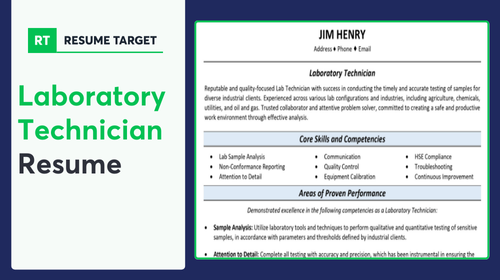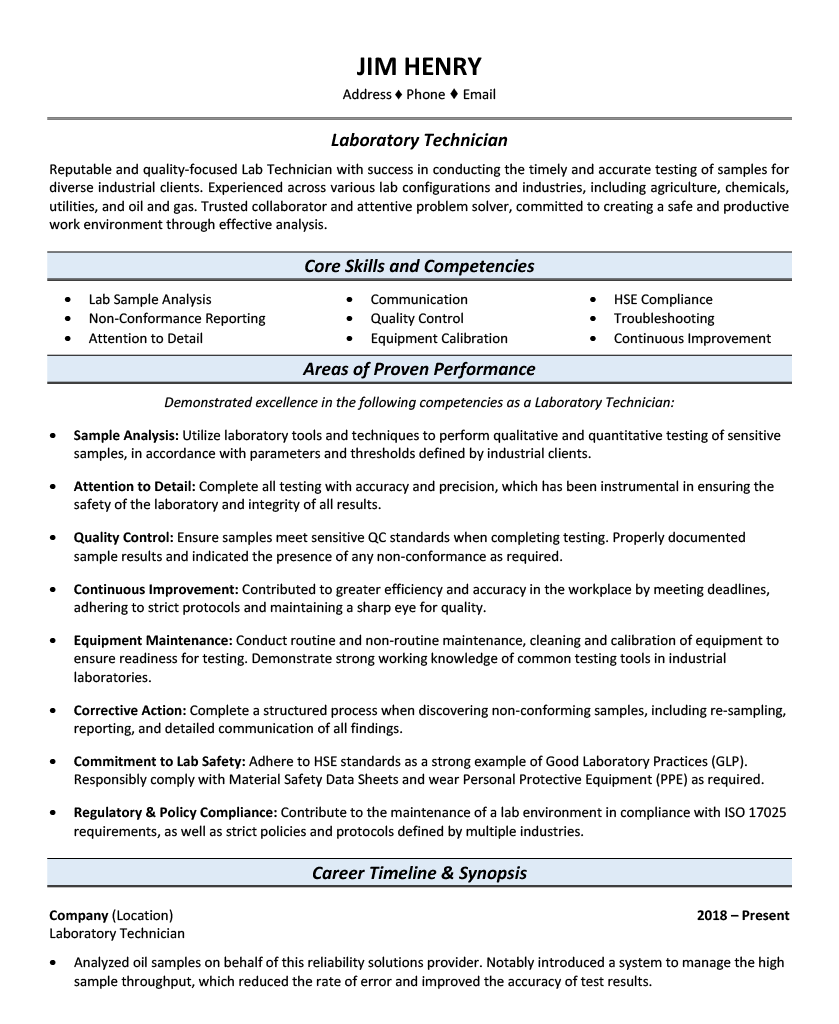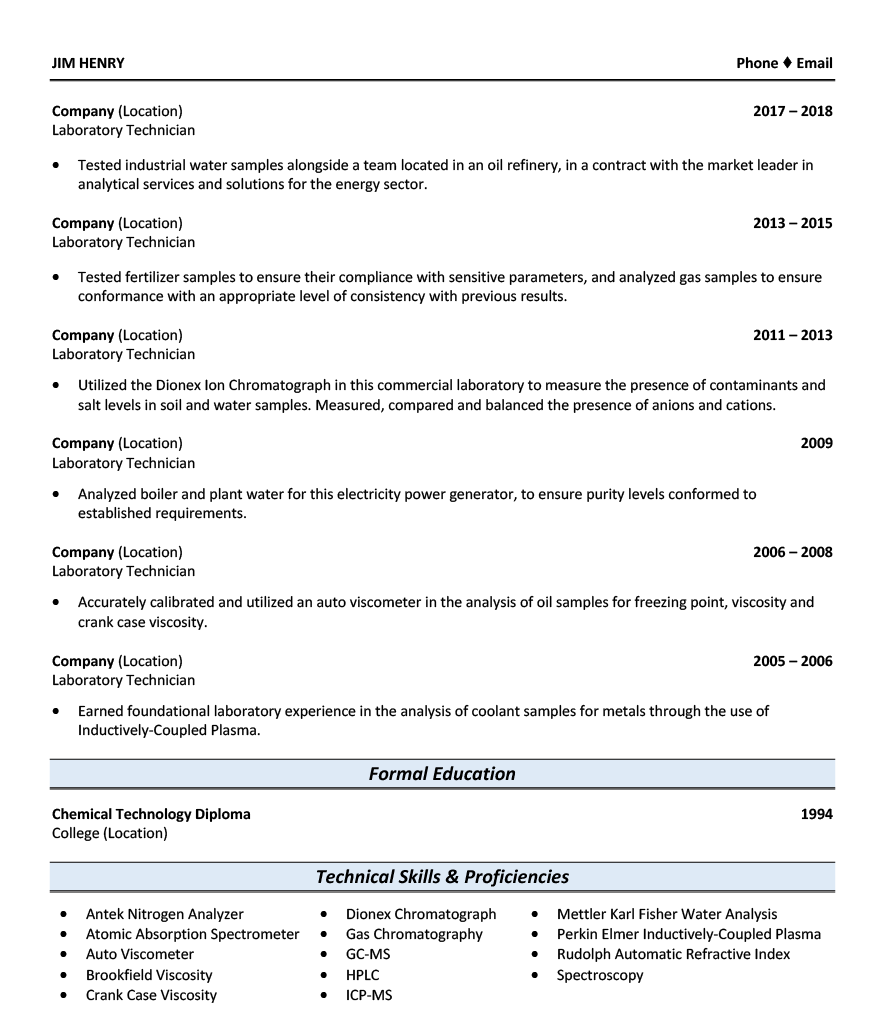

Turning complex lab procedures into compelling resume content can feel like an impossible experiment. Many lab technicians get stuck listing basic duties instead of showcasing their true technical expertise.
Are you struggling to make your precise analytical skills stand out to employers? Your resume needs to demonstrate both your technical mastery and your impact on diagnostic accuracy and lab efficiency.
At Resume Target, we understand how to translate detailed laboratory work into powerful career achievements. We help laboratory technicians showcase their technical expertise while highlighting the critical role they play in healthcare outcomes.


Behind every critical medical diagnosis, there's a laboratory technician meticulously analyzing samples and conducting tests that help doctors make life-saving decisions - in fact, these professionals conduct over 13 billion laboratory tests annually in the United States alone.
As a laboratory technician, you'll become an expert at operating sophisticated diagnostic equipment, performing detailed analyses of blood, tissue, and other biological samples, and maintaining the exacting standards required for accurate medical testing.
Whether you're just starting out performing routine tests or advancing to handle more complex analyses as a technologist, the laboratory science field offers clear pathways for growth, with opportunities to specialize in areas like blood banking, microbiology, or molecular diagnostics.
Let's talk about the exciting earning potential in the Laboratory Technician field! Your career path as a Lab Tech offers impressive growth opportunities, with compensation varying based on your experience level and workplace setting. And guess what? Specialty hospitals tend to offer particularly attractive packages for professionals in this field.
Figures from: Medical Technology Schools
Starting as a lab tech opens doors to exciting growth opportunities. With experience and education, you can advance from entry-level positions to senior scientist roles or specialized laboratory management.
Beyond basic lab procedures, advancing your career requires mastering a combination of technical expertise and professional capabilities that set you apart in the laboratory field.
- Aseptic technique and contamination control - Advanced laboratory equipment operation - Data analysis and research methodology - Leadership and team collaborationLaunch your laboratory technician career by combining hands-on experience with entry-level positions in clinical, research, or industrial labs while pursuing relevant certification or education.
To excel in this field, you'll need to develop essential skills like aseptic technique, which forms the foundation of laboratory work alongside analytical thinking and precise data management.
Requirements from Trusted Health
From bustling hospitals to private labs, Lab Tech opportunities span coast to coast, with Texas and California leading the pack.
Figures from U.S. Bureau of Labor Statistics
Here's what's exciting: You'll find most opportunities (36%) in general medical and surgical hospitals, with another 21% in medical diagnostic laboratories. And guess what? Physician offices are also actively hiring, accounting for 9% of lab tech positions. Whether you prefer the fast pace of a hospital setting or the focused environment of a private lab, there's a workplace that matches your style.Struggling to extract the most impressive highlights from your dental career and present them in a way that makes hiring managers want to schedule an interview? In this comprehensive guide, we'll walk you through each section of your dentist resume, showing you exactly how to showcase your clinical expertise, patient care achievements, and technical skills.
As a dental professional who excels at providing patient care, crafting the perfect resume summary might feel as challenging as performing a complex root canal without proper imaging.
While you're skilled at transforming smiles and managing complex oral health cases, translating your clinical expertise, patient rapport, and technical abilities into a compelling written summary can leave even the most experienced dentists feeling uncertain about how to best showcase their value to potential employers.
How would you describe your overall approach to patient care and the unique blend of clinical expertise and chairside manner you bring to dental practice?
Reason: This helps frame your professional identity and distinguishes you from other dentists by highlighting both technical competency and interpersonal skills - two critical elements that define successful dental practitioners.
What combination of dental specialties and treatment approaches best represents your practice philosophy and the scope of care you provide to patients?
Reason: This question helps articulate your professional focus and demonstrates the breadth of your capabilities, allowing potential employers to quickly understand your practice style and specialization areas.
How would you characterize your commitment to staying current with dental technologies and techniques while maintaining traditional quality care standards?
Reason: This highlights your dedication to professional development and modern dentistry while emphasizing your foundation in established best practices - a balance that's increasingly important in contemporary dental practices.
As a dental professional, you need to showcase both your clinical expertise and patient care abilities, from complex procedures like root canals and implants to essential interpersonal skills that help put patients at ease.
Your skills section should balance technical proficiencies (such as digital imaging and specific treatment procedures) with practical abilities like treatment planning and team leadership that demonstrate your complete capabilities as a dental practitioner.
Showcase your clinical expertise and patient care achievements by organizing your dental experience into three powerful sections: a concise role overview, quantifiable treatment outcomes, and core clinical responsibilities that highlight your comprehensive skills as a dental professional.
Many dental professionals struggle to translate their daily patient care and technical procedures into compelling achievements that showcase their true business impact. Transform your clinical expertise into powerful metrics by connecting patient outcomes, practice growth, and operational improvements to specific numbers that demonstrate your comprehensive value to potential employers.
A well-crafted responsibilities section demonstrates how dentists deliver comprehensive oral healthcare beyond basic cleanings and fillings. Your duties should showcase both technical expertise and patient care abilities while connecting your daily work to overall practice success and community health outcomes.
Your dental education and board certifications are the foundation of your professional credibility, so list them prominently at the top of your resume. Start with your dental degree (DDS/DMD) and include any specialty certifications or advanced training in areas like orthodontics, periodontics, or oral surgery that demonstrate your expertise.
Now that you've built a strong foundation using Resume Target's expert guidelines for resume writing, you're ready to transform your base resume into a powerful job-landing tool.
While many lab technicians make the mistake of using the same resume for every application, successful candidates know that personalizing their resume for each position is just as crucial as customizing their cover letter.
By carefully aligning your resume's keywords and achievements with each specific laboratory position's requirements, you'll not only sail through ATS screening systems but also demonstrate to hiring managers that you're precisely the skilled technician they're seeking.
Ready to stand out from other candidates? Let's turn your solid resume into a laser-focused presentation that proves you're the perfect fit for your target lab position!
Don't let a lack of professional lab experience hold you back! Your journey to becoming a Laboratory Technician can start with highlighting your academic lab work, relevant coursework, and hands-on projects.
Even without direct work experience, you can showcase your practical skills through classroom experiments, research projects, and any volunteer or internship experience in scientific settings.
Focus on highlighting your technical lab skills, safety protocol knowledge, and analytical abilities in your resume.
For more guidance on structuring your entry-level resume, check out the Student Resume Writing Guide to ensure you're presenting your qualifications effectively.
Your resume summary is your chance to showcase your scientific knowledge, laboratory coursework, and any hands-on experience from academic projects or internships.
Focus on highlighting your technical skills, attention to detail, and passion for laboratory work rather than dwelling on limited work experience.
"Detail-oriented and methodical Laboratory Technician with comprehensive academic training and 1+ year of hands-on experience through university research projects and internships. Proficient in standard laboratory procedures, equipment maintenance, and safety protocols, with experience in sample preparation and analysis. Demonstrated ability to maintain accurate documentation and assist senior researchers with experiments. Seeking to leverage strong analytical skills and laboratory expertise to contribute to a dynamic research environment while ensuring compliance with quality control standards."
Now's your chance to showcase the scientific foundation and hands-on training that makes you a qualified lab professional!
Transform your academic experience into compelling content by highlighting relevant coursework like analytical chemistry and microbiology, plus standout laboratory projects that demonstrate your practical skills with equipment and procedures.
Common courses for a Laboratory Technician degree/certification include Medical Terminology, Blood Bank, Basic Lab Skills, Phlebotomy, QA Lab Math, Urinalysis, Basic Immunology Concepts, Clinical Chemistry, Basic Hematology, Coagulation, Advanced Hematology, Clinical Microbiology, Advanced Microbiology, Clinical Experience 1 and 2, Introduction to Molecular Diagnostics, Written Communication, Oral/Interpersonal Communication, General Anatomy & Physiology, Intro to Biochemistry, Microbiology, Intro to Ethics: Theory & Application, Intro to Psychology [1]. General education courses in biology, general chemistry, mathematics, communications, humanities, and social sciences are also common [2].Relevant Coursework: Medical Terminology | Clinical Chemistry | Advanced Hematology | Clinical Microbiology | Basic Lab Skills | Molecular Diagnostics
Key Projects:
Clinical Sample Analysis Protocol Development: Designed and implemented a standardized procedure for processing multiple sample types while maintaining quality control standards and improving workflow efficiency.
Automated Testing System Integration: Collaborated with a team of four technicians to validate and optimize a new automated hematology analyzer for routine blood testing.
Leverage your academic training, laboratory coursework, and hands-on experience to showcase the precise technical abilities and safety protocols that make you an ideal candidate for laboratory positions.
As an entry-level Laboratory Technician, your foundation in essential lab procedures and safety protocols positions you well for growth in clinical, research, or industrial laboratory settings, where demand for skilled technicians continues to rise.
When you're spending your days managing complex lab protocols and precise analytical procedures, finding the right words to showcase your technical expertise on paper can feel like solving an impossible equation.
At Resume Target, we specialize in translating intricate biotech laboratory skills into compelling career stories that hiring managers understand and value.
Our expert writers have helped countless lab technicians like you transform detailed methodologies and technical procedures into powerful achievement statements that highlight your true impact in the lab.
With biotech companies rapidly expanding their research teams, now is the perfect time to ensure your resume stands out from the crowd - let's connect today for a free resume review that will help launch your next career move.
Impress any hiring manager with our Biotechnology resume writing service. We work with all career levels and types of Biotechnology professionals.
Learn More → Biotechnology Resume Writing Services